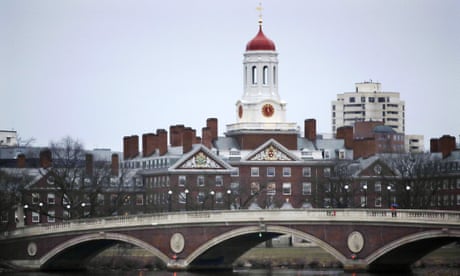- by foxnews
- 10 Mar 2025
Harvard professor’s fossil fuel links under scrutiny over climate grant
Harvard professor’s fossil fuel links under scrutiny over climate grant
- by theguardian
- 02 Apr 2023
- in news

An eminent Harvard environmental law professor's links to the fossil fuel industry are under scrutiny from colleagues and students after she was awarded a prestigious research grant to investigate corporate climate pledges.
Jody Freeman, founding director of Harvard's environmental and energy law program and former Obama-era White House advisor, is a paid board member of ConocoPhillips - a Fortune 500 American multinational oil and gas company that was ranked the 13th most polluting in the world by a Guardian investigation in 2019. The firm's controversial Willow drilling project in Alaska was recently approved by the Biden administration.
Professor Freeman also co-chairs Harvard's presidential committee on sustainability and was recently awarded funding by the university's new Salata Institute for Climate and Sustainability to lead research on corporate net zero targets.
Colleagues say Freeman's fossil fuel ties raises serious questions about a conflict of interest, while threatening to damage the university's climate credentials.
A letter by the Harvard Faculty Divest steering committee - a diverse group of professors who advocate for an end to fossil fuels - to the president-elect of the Ivy league school sets out the conflict between Freeman's fiduciary responsibility to ConocoPhillips and Harvard's own climate commitments.
The letter, obtained by the Guardian, was sent on Wednesday to the president-elect, Claudine Gay, and James Stock, vice-provost for climate and sustainability, and states:
"The Salata Institute asserts it 'will not accept funds from, or partner with, any company that does not share the goal of moving our global economy away from fossil fuels,' [so] we ask: why does this policy not exclude awarding funds to a board member of one of the world's most intransigent fossil fuel merchants?"
Harvard's stated goal is to be "fossil fuel-free by 2050 and fossil fuel-neutral by 2026", while the Salata Institute's mission is to "develop and promote durable, effective, and equitable solutions to the climate change challenges confronting humanity".
In a statement to the Guardian, Freeman defended her position: "I share the goal of moving the world to a low-carbon future as fast as possible and forcefully addressing the enormous challenges posed by climate change. There are many ways to make a difference, and activism is very important. I have chosen to engage in several ways, including by being an independent director on the board of ConocoPhillips to help advance the transition to a low-carbon economy, and think my involvement there remains positive."
ConocoPhillips' Willow project in Alaska is a huge decades-long drilling venture that will release millions of additional tons of planet-warming emissions into the atmosphere every year. The International Energy Agency has warned that new oil projects are incompatible with the world reaching "net zero" emissions by 2050.
Regina LaRocque, an associate professor of medicine at Harvard medical school who signed the faculty letter, told the Guardian: "Professor Freeman's fiduciary responsibility to advance the interests of ConocoPhillips appears to me to be in direct conflict with the stated climate goals of Harvard, which is problematic."
The intervention calling for an explanation from the Harvard leadership came as students from Harvard Divest wrote an open letter calling on Professor Freeman to resign from ConocoPhillips - or leave her academic post.
The students wrote: 'Professor Freeman, until now, you have justified your position as helping reform ConocoPhillips from the inside. The Willow Project makes clear that this isn't working. Despite your years of service, ConocoPhillips remains further from Paris alignment than almost all of its peer investor-owned fossil fuel companies. At a certain point, it is important to ask yourself whether you are being used - if ConocoPhillips isn't paying for your expertise, but instead co-opting the respect and legitimacy accorded to someone of your position."
Harvard declined to comment on the letters.
The Harvard conflict comes amid growing scrutiny over the deep ties between America's most prestigious academic institutions and the fossil fuel industry - which are ongoing despite climate pledges by universities like Harvard and Princeton.
On Monday, the Guardian revealed that an Exxon scientist had an office and taught a class at Princeton. Harvard and Princeton are among the top 10 select US universities that received the most donations from the fossil fuel industry between 2010 and 2020, according to Data Progress.
Last year, the Boston Globe revealed how the gas industry secretly helped to write a University of Massachusetts pro-hydrogen academic paper that later got published in a peer-reviewed journal.
"Universities must listen to their faculty and students [and] cut all research and funding ties with the industry."
- by foxnews
- descember 09, 2016
Ancient structure used for cult 'rituals' discovered by archaeologists
A Neolithic Timber Circle was discovered by archeologists in Denmark resembling the historical landmark Stonehenge in the U.K. It is open to be viewed by the public.
read more


